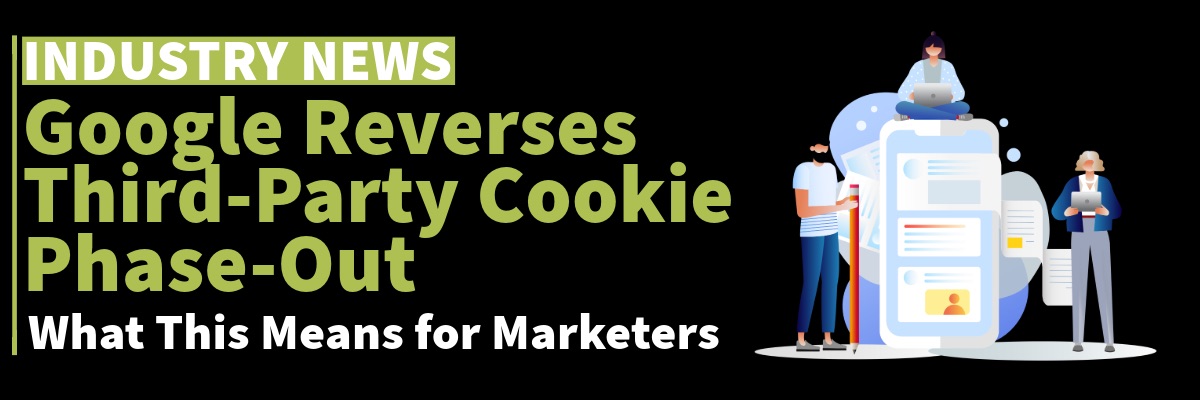Google has announced it will not phase out third-party cookies in Chrome, a significant shift from its earlier plans. This decision, though not widely publicized, carries substantial implications for digital marketers. This blog explores the history of Google’s stance on third-party cookies, the recent announcement, and its impact on consumers and marketers.
The Background
Google first announced its intention to deprecate third-party cookies in January 2020, aligning with industry trends towards enhancing user privacy. Browsers like Mozilla Firefox and Safari had already blocked third-party cookies, prompting Google to follow suit. Initially set to be phased out by 2022, the plan faced multiple delays as Google struggled to balance privacy concerns with the advertising industry’s needs.
The Recent Announcement
On July 22, 2024, Google confirmed it would retain third-party cookies in Chrome, opting instead for a new user experience. Anthony Chavez, vice-president of Privacy Sandbox, noted that Chrome users will now see a one-time prompt to set their cookie preferences, which can be adjusted at any time. This approach aims to offer users more control over their privacy without completely eliminating third-party cookies.
Google’s tests with its Privacy Sandbox tools showed promising results, with Google Display Ads seeing a 97% ad spend recovery and Display & Video 360 (DV360) achieving an 86% recovery. These figures indicate that Privacy Sandbox can maintain strong advertising performance even without third-party cookies. However, remarketing efforts showed lower effectiveness, with only a 55% recovery rate, highlighting the challenges in reaching users without third-party cookies.
Anthony Chavez emphasized the goal of elevating user choice: “Instead of deprecating third-party cookies, we would introduce a new experience in Chrome that lets people make an informed choice that applies across their web browsing, and they’d be able to adjust that choice at any time”.
Implications for Consumers
For consumers, this shift emphasizes user choice and privacy. The new prompt will allow users to make informed decisions about their cookie settings, similar to Apple’s app tracking transparency measures, which significantly impacted social media platforms’ ad revenues. This change aims to balance privacy concerns with the need for effective advertising while providing users with greater control over their data.
Implications for Marketers
For digital marketers, Google’s decision provides a respite from the anticipated disruption of losing third-party cookies. Here’s what it means:
- Continued Use of Third-Party Cookies: Marketers can continue utilizing third-party cookies for targeting and remarketing, maintaining the status quo in the short term.
- Privacy Sandbox Tools: Google’s Privacy Sandbox, which includes tools like the Topics API and Attribution Reporting API, will still play a crucial role. Initial tests showed promising results with ad spend recovery rates close to pre-cookie deprecation levels, although remarketing faced challenges.
- Strategic Diversification: Despite the reprieve, marketers should diversify their strategies, investing in first-party data and exploring contextual advertising to future-proof their marketing efforts.
Google’s shift in its third-party cookie strategy offers both relief and a new direction for digital marketers. While the immediate need to abandon third-party cookies is postponed, the focus on privacy and user choice remains paramount. Marketers should continue to innovate and adapt to ensure they remain effective and compliant in this evolving landscape.
If you’re interested in learning more about detailed targeting and remarketing for your business, click to book a growth call.
Ready to see what TheRiot Agency can do for your campaigns?

“I had used several agencies in the past with lackluster results. When I found TRA in 2018, I wasn’t sure if an outsourced brand marketing model would work for me, we have since implemented robust PPC campaigns that have provided opportunities in my inbox! So many that we have fully moved onto HubSpot to begin automating the sales process! Highly Recommend partnering with them!”

“TRA came recommended to me by a fellow financial services owner and I couldn’t be happier that they made the introduction. We spoke on a Friday and got started the very next week, that was over 2 years ago! We just completed a rebranding and I couldn’t be more excited for the growth trajectory that they have helped put us on!”
“TRA functions as a part of our team. Helping us in not only redefining Tech Etch’s brand strategy and customer experience but also in taking those changes and putting them into practice through the use of technology to generate real, measurable growth. These changes have played a crucial role in pursuit of our both short term and long-term organizational goals”

“Before working with TheRiot Agency, I was on the hunt for a partner that would elevate my growing business. I engaged TheRiot Agency to overhaul my website and implement a brand strategy that drives leads to my business through a localized, analytical and SEO-driven content approach. My experience has been great and I highly recommend them.”
Lost, But Not Forgotten: Learn to Formulate Your Brand Identity and Growth!
Creating your brand identity is important for selling your product or service. Simply put, the more people know and are attracted to your brand, the more chances you have of increasing sales. The brand identity helps you build your company's overall structure so [...]
The Top 5 Ways Businesses Are Utilizing Automation To Succeed
Every business wants to grow. With the proper tools and tactics, making more sales can come easy. But with more sales comes more work…unless you add automation to the mix. Automation can both [...]






